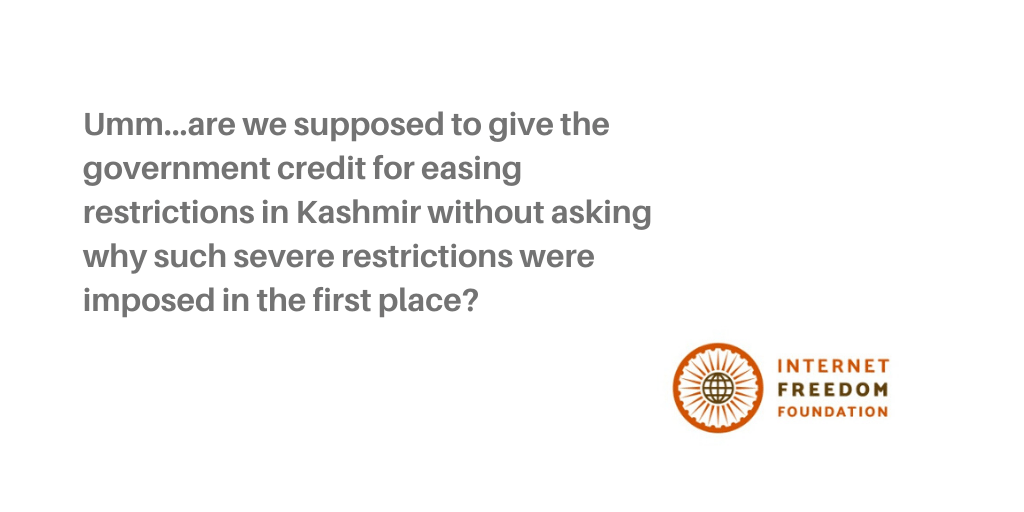
Tl;dr
The Solicitor General, Tushar Mehta began arguments for the government before the Supreme Court today in Anuradha Bhasin’s petition against the communication shutdown and movement restrictions in Kashmir. He started by arguing that what happened on 05 August 2019 was a conferment of rights on the people of Jammu and Kashmir rather than a restriction of rights. According to him, due to the abrogation of Article 370, the residents of Jammu and Kashmir can now take advantage of 106 people friendly laws. He criticized the petitioner and intervenors for painting a grim picture of the situation prevailing in Kashmir and cited certain facts and figures to demonstrate normalcy in the region. He finally submitted that the powers under Section 144, CrPC could be invoked pre-emptively in anticipation of public disorder and urged the Court to not scrutinize the orders too stringently.
Not in our names
The Solicitor General, Tushar Mehta started arguments for the Former State of Jammu and Kashmir on an unexpected note today. He insisted that the actions of the government on 05 August 2019 must be applauded because they have conferred basic human rights that the people of Jammu and Kashmir were previously denied due to Article 370. Some of the examples cited by him include strengething of panchayati raj institutions, safai karamcharis and women being able to own property, SC/ST individuals being able to avail reservation benefits, central legislations on prohibition of child marriage, juvenile justice, domestic violence and right to education being made applicable to the region, and justice for West Pakistan refugees. The factual veracity of these claims is questionable, and this attempt at appropriation of progressive causes to justify the clampdown in Kashmir will be addressed by the petitioner and intervenors during their rejoinder.
All is well now in November
Mr. Mehta accused the petitioner and intervenors of resorting to hyperbole and misrepresenting the situation on the ground in Kashmir. He criticized the petitioner and intervenors for failing to highlight the easing of restrictions by the government during their oral submissions and stated that the region has not been under complete clampdown for over 100 days. He added that since the restrictions have been significantly eased now, scrutinizing the state of affairs in August is an "academic exercise" and the case has outlived itself. He quoted government statistics relating to restoration of telecommunication services, easing of movement restrictions, board exam attendance rates, functioning of hospitals, provision for public transport, internet access terminals, tourism, media facilitation centre etc to counter the petitioner and intervenors' arguments about a humanitarian crisis existing in Kashmir.
These facts and figures were not made available to the petitioner, intervenors or the court in advance and they were tendered across the table during the hearing. The veracity of these factual assertions will also be challenged by the petitioner and intervenors during the rejoinder. For instance, the inadequate and insecure nature of the media facilitation centre had already been mentioned in the pleadings filed by the petitioner and the intervenors but the government did not address any of these concerns. Read more about the problems with the media facilitation centre in Srinagar here and here.
Cracking nuts with sledgehammers
Throughout today’s hearing, the government maintained that the vast majority of people in Kashmir are law abiding and peace loving. However, there is a “miniscule minority” which indulges in separatism and cross border terrorism, and the government had to impose restrictions on everyone because they cannot separate the chaff from the grain.
The Solicitor General, Tushar Mehta and Attorney General, KK Venugopal cited historical figures relating to terrorist violence since 1990 and the Supreme Court’s observations in another case about Pakistan supporting terrorist groups like the Hurriyat to establish why these restrictions were required. The government lawyers claimed that terrorists were not just physically penetrating India’s borders but they were also mobilizing people through digital platforms. However, the government did not explain why one to one modes of communication such as landlines and voice calls which cannot be used for mass messaging were shutdown and why the restrictions were not limited to social media platforms.
Mr. Mehta further urged the court to not evaluate the orders under Section 144, Cr.P.C. imposing movement restrictions too strictly because they were issued by district magistrates who are not legally trained. He also argued that the fact that several restrictions were either not imposed or relaxed sooner in Jammu and Ladakh compared to Kashmir demonstrates that there was application of mind by the government officials.
The Solicitor General will continue his arguments on Monday, 25 November 2019 and the petitioner and intervenors will respond to the government’s assertions after that. You can also read detailed live tweets of today’s hearing from Bar and Bench, Live Law and Vakasha Sachdev from the Quint.
Important Documents:
- Status Report dated 20.11.2019 filed by the Government (link)
